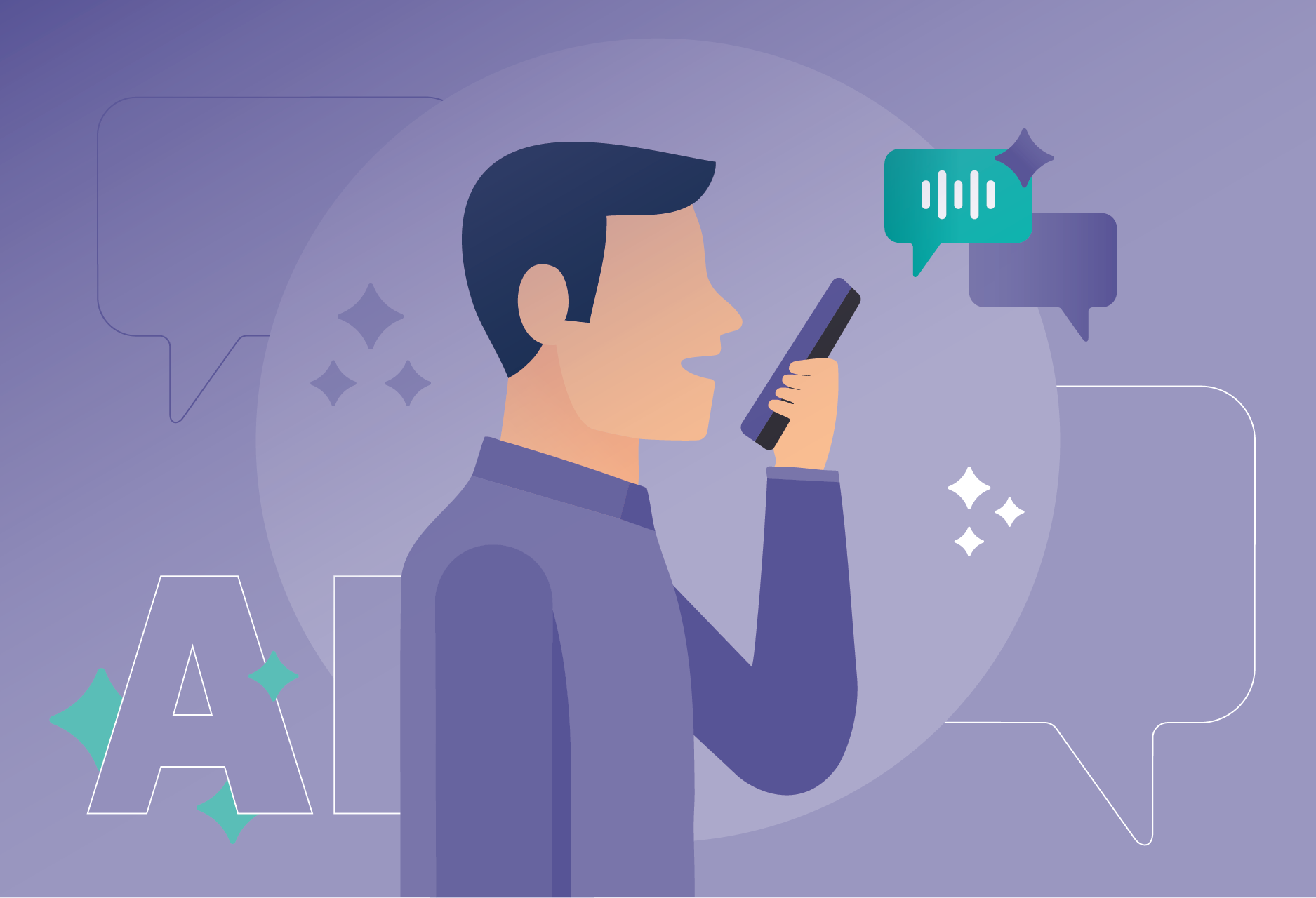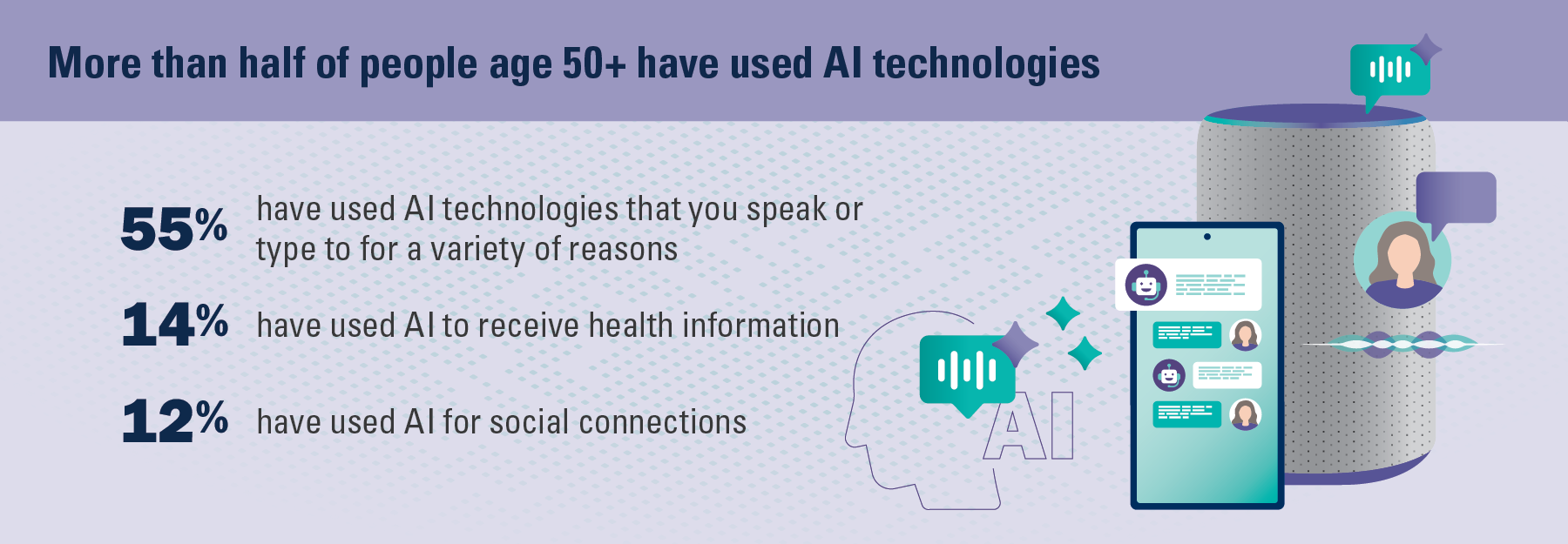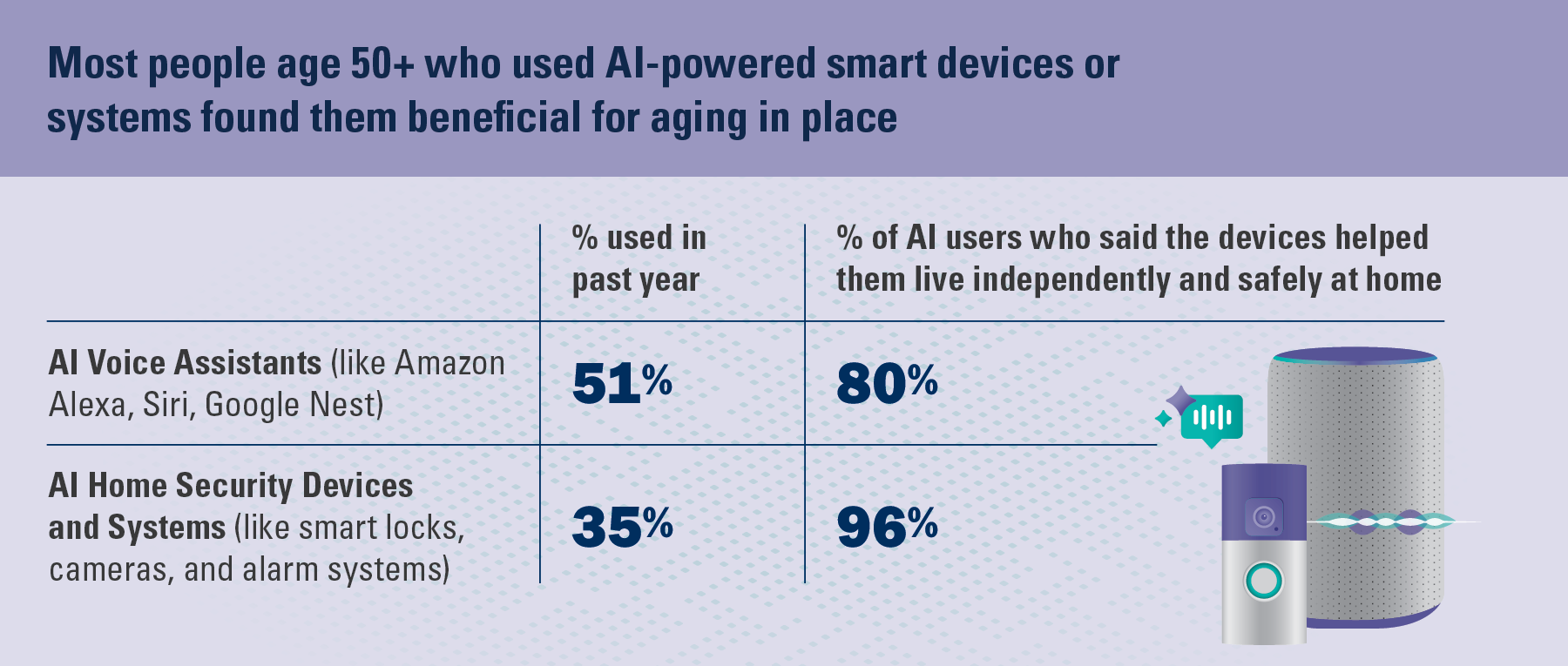
Key Findings
- 55% of people age 50 and older said they have used AI technologies that you speak or type to for a variety of purposes, including for health information and social connection.
- 96% of older adults who used AI-powered home security devices and systems and 80% who used AI-powered voice assistants in the past year said these devices help them live independently and safely in their home.
- 92% of adults age 50 and older agreed they want to know if the information they receive is from a person or generated by AI, and 81% said they want to learn more about the risks of AI.
- 46% of older adults said they have very little to no trust in AI-generated information.
Artificial intelligence (AI) refers to computers, devices, or machines that use data to make predictions and complete tasks such as learning new things, solving problems, and making decisions. AI technologies can be useful to older adults in many ways that relate to health, including improving home safety, providing information about health conditions, and helping people age in place. However, AI technologies also raise concerns about privacy, data security, and inaccurate information. In February 2025, the University of Michigan National Poll on Healthy Aging asked a national sample of adults age 50 and older about their experiences with and views on AI technologies.

Older adults’ AI usage
Speech-based and text-based AI
Overall, 55% of people age 50 and older said they have ever used AI technologies that you speak to (like Amazon Alexa, Siri, or Google Assistant) or type to (like ChatGPT, Gemini, or Copilot) for one or more of the following purposes:
- For entertainment (37%)
- To receive non-health information (30%)
- To receive health information (14%)
- For social connection (12%)
- To create text or images (11%)
- To plan an activity (such as a trip) (9%)
Interest in daily use of AI
Overall, 35% of people age 50 and older reported interest in using AI in their day-to-day lives. Older adults who rated their physical health as fair or poor were less likely than those who rated their physical health as good to excellent to express interest in using AI in their day-to-day lives (29% fair or poor physical health vs. 36% good to excellent physical health).
Benefits of using AI-powered devices to age in place
Voice assistants
Of the 51% of adults age 50 and older who reported using AI-powered voice assistants (like Amazon Alexa, Siri, or Google Nest) in the past year, 28% said these devices are very beneficial in helping them live independently and safely in their home, 52% said they are somewhat beneficial, 14% said they are not beneficial, and 6% were unsure.
Home security devices and systems
Of the 35% of adults age 50 and older who reported using AI-powered home security devices and systems (like smart locks, cameras, and alarm systems) in the past year, 56% said they are very beneficial in helping them live independently and safely in their home, 41% said they are somewhat beneficial, 3% said they are not beneficial, and 1% were unsure.*
Trust in AI-generated information
More than half of adults age 50 and older (54%) reported having at least some trust in information generated by AI (4% a lot, 49% some), while 46% had very little to no trust in AI-generated information (30% very little, 16% not at all).* Older adults who have used AI were more likely to have trust (a lot or some) in AI-generated information than those who have not used AI (70% AI users vs. 34% non-users).
Also, older people who said their physical health or mental health was good to excellent were more likely to have trust in AI-generated information than those who said their physical health or mental health was fair or poor.
AI or humans?
Most people age 50 and older (92%) agreed that they want to know if information they receive is from a person or generated by AI.
The poll also asked older adults to compare their experiences receiving health information using AI versus interacting with a person, either face-to-face or on the phone. Among those who have used AI technology to receive health information, 47% said humans are better, 26% said AI and humans are about the same, 10% said AI is better, and 18% were unsure if AI or humans are better.
Identifying incorrect information from AI
Overall, 50% of adults age 50 and older said they feel confident (6% very, 44% somewhat) in their ability to identify when information created by AI is incorrect, while the remaining 50% said they are not confident (35% not very, 15% not at all) in being able to. Older adults who have used AI were more likely to be confident in their ability to identify incorrect AI-created information than those who have not used AI (57% AI users vs. 41% non-users).
In addition, older people reporting fair or poor physical health were more likely than those reporting good to excellent physical health to say they are not very confident or not at all confident in recognizing incorrect information from AI (57% fair or poor physical health vs. 49% good to excellent physical health).
Learning more about the risks and benefits of AI
In all, 81% of people age 50 and older would like to learn more about the risks of AI, and 58% would like to learn more about the benefits of AI.
Also, 14% of adults age 50 and older strongly agreed that AI will do more harm than good, 39% agreed, 43% disagreed, and 5% strongly disagreed.*

Implications
This poll found that more than half of U.S. adults age 50 and older have used AI-powered technologies for a variety of reasons, including for health information and social connection, and more than three out of every 10 older adults are interested in using AI in their daily lives.
AI technologies can be used to support healthy aging and aging in place. For example, among the 35% of older adults in this poll who reported using AI-powered home security devices and systems, nearly all found them very beneficial for independent living, an important component of healthy aging. Beneficial features of AI-powered home security systems and devices can include making doorbell camera footage sharper, detecting package deliveries, and providing alerts if an alarm sounds. In addition, most older adults who used voice assistants described them as beneficial for aging in their homes safely and independently. Voice assistant devices can help older people, especially those who have challenges with dexterity or vision, find information faster and foster social connections.
Some older adults reported using AI for getting health information, which may offer people more control over how and when they can get answers to health questions. Yet those who rely on AI for health information could be subject to inaccurate or incomplete AI-generated information, which can be risky in some health situations such as when managing medications or investigating the cause of new symptoms.
AI use in search engine results pages is increasing. Many of these search engines tell users if the information they are seeing was generated by AI, which supports our poll finding that most older adults want to know whether their information comes from a person or AI. However, this kind of transparency is still rare. Other digital spaces that use AI, like patient portal assistants, chatbots, and voice assistants, could model search engines by adding clear statements to inform users when they are receiving AI-generated information.
Older adults overwhelmingly agreed that they would like to learn more about the risks of AI use. To support older people in learning about AI risks, education and information sessions could focus on topics like privacy and data security when using AI, what “hallucinations” are (i.e., how AI might unintentionally produce inaccurate information that sounds correct), and how AI tools may be different from other digital sources, such as social media (like Facebook, YouTube, or Instagram) or search engines (like Google, Yahoo!, or Bing).
These findings present opportunities for older adults and their families to learn about ‘healthy’ AI use. ‘Healthy’ AI use can include reflecting on when to use AI instead of a search engine, or how to use AI to support healthy aging, such as accessing non-urgent health information. Further, exercising caution about use of AI could include learning about safety practices such as how to double-check information generated by AI or report when information is inaccurate.
Community organizations, including public spaces like libraries, have an opportunity to use these findings to shape AI information sessions for older adults. Poll insights could also be valuable for health care providers in answering patients’ questions about information generated from AI, especially as their institutions use more patient-facing AI-powered tools such as chatbots.
As AI-powered tools become more common in society, using these technologies to promote healthy aging, while reducing risks, will be crucial.
*Percentages do not add to 100% due to rounding.
Data Source and Methods
This National Poll on Healthy Aging report presents findings from a national household survey conducted exclusively by NORC at the University of Chicago for the University of Michigan’s Institute for Healthcare Policy and Innovation. This survey module was administered online and by phone from February 4th–28th, 2025, to a randomly selected, stratified group of U.S. adults age 50–97 (n=2,883), with an oversample of non-Hispanic Black, Hispanic, and Asian American and Pacific Islander populations. The survey completion rate was 32% among panel members invited to participate. The margin of error is +/- 1 to 3 percentage points for questions asked of the full sample and higher among subgroups.
Findings from the National Poll on Healthy Aging do not represent the opinions of the University of Michigan. The University of Michigan reserves all rights over this material.
Read past National Poll on Healthy Aging reports and about the poll methodology.
Citation
National Poll on Healthy Aging Team. How Older Adults Use and Think About AI. University of Michigan National Poll on Healthy Aging. July/August 2025. Available at https://dx.doi.org/10.7302/26593.